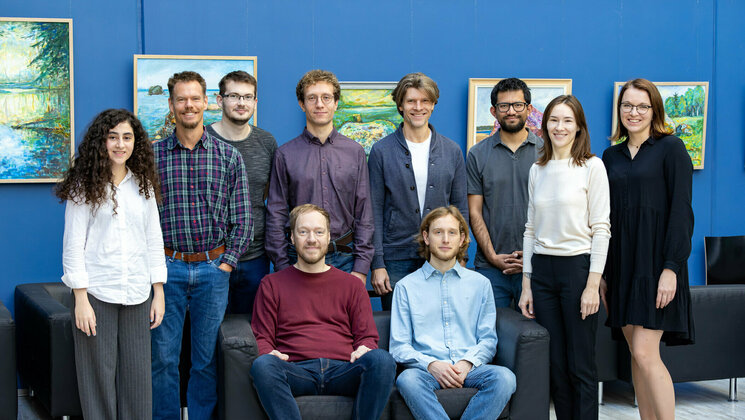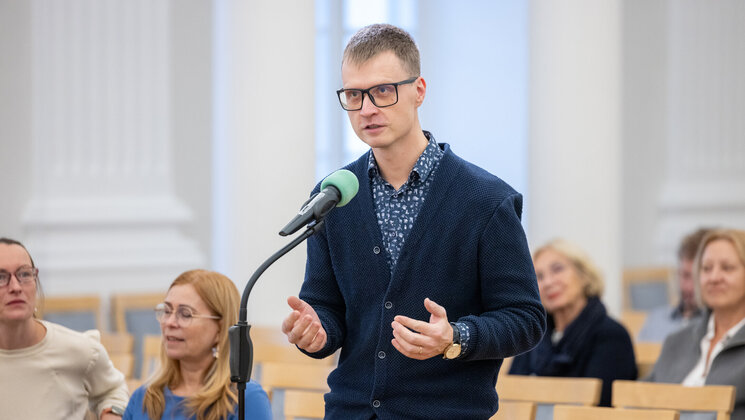-
Faculty of Arts and HumanitiesDean's Office, Faculty of Arts and HumanitiesJakobi 2, r 116-121 51005 Tartu linn, Tartu linn, Tartumaa EST0Institute of History and ArchaeologyJakobi 2 51005 Tartu linn, Tartu linn, Tartumaa EST0Institute of Estonian and General LinguisticsJakobi 2, IV korrus 51005 Tartu linn, Tartu linn, Tartumaa EST0Institute of Philosophy and SemioticsJakobi 2, III korrus, ruumid 302-337 51005 Tartu linn, Tartu linn, Tartumaa EST0Institute of Cultural ResearchÜlikooli 16 51003 Tartu linn, Tartu linn, Tartumaa EST0Institute of Foreign Languages and CulturesLossi 3 51003 Tartu linn, Tartu linn, Tartumaa EST0School of Theology and Religious StudiesÜlikooli 18 50090 Tartu linn, Tartu linn, Tartumaa EST0Viljandi Culture AcademyPosti 1 71004 Viljandi linn, Viljandimaa EST0Professors emeriti, Faculty of Arts and Humanities0Associate Professors emeriti, Faculty of Arts and Humanities0Faculty of Social SciencesDean's Office, Faculty of Social SciencesLossi 36 51003 Tartu linn, Tartu linn, Tartumaa EST0Institute of EducationJakobi 5 51005 Tartu linn, Tartu linn, Tartumaa EST0Johan Skytte Institute of Political StudiesLossi 36, ruum 301 51003 Tartu linn, Tartu linn, Tartumaa EST0School of Economics and Business AdministrationNarva mnt 18 51009 Tartu linn, Tartu linn, Tartumaa EST0Institute of PsychologyNäituse 2 50409 Tartu linn, Tartu linn, Tartumaa EST0School of LawNäituse 20 - 324 50409 Tartu linn, Tartu linn, Tartumaa EST0Institute of Social StudiesLossi 36 51003 Tartu linn, Tartu linn, Tartumaa EST0Narva CollegeRaekoja plats 2 20307 Narva linn, Ida-Virumaa EST0Pärnu CollegeRingi 35 80012 Pärnu linn, Pärnu linn, Pärnumaa EST0Professors emeriti, Faculty of Social Sciences0Associate Professors emeriti, Faculty of Social Sciences0Faculty of MedicineDean's Office, Faculty of MedicineRavila 19 50411 Tartu linn, Tartu linn, Tartumaa ESTInstitute of Biomedicine and Translational MedicineBiomeedikum, Ravila 19 50411 Tartu linn, Tartu linn, Tartumaa ESTInstitute of PharmacyNooruse 1 50411 Tartu linn, Tartu linn, Tartumaa ESTInstitute of DentistryL. Puusepa 1a 50406 Tartu linn, Tartu linn, Tartumaa ESTInstitute of Clinical MedicineL. Puusepa 8 50406 Tartu linn, Tartu linn, Tartumaa ESTInstitute of Family Medicine and Public HealthRavila 19 50411 Tartu linn, Tartu linn, Tartumaa ESTInstitute of Sport Sciences and PhysiotherapyUjula 4 51008 Tartu linn, Tartu linn, Tartumaa ESTProfessors emeriti, Faculty of Medicine0Associate Professors emeriti, Faculty of Medicine0Faculty of Science and TechnologyDean's Office, Faculty of Science and TechnologyVanemuise 46 - 208 51003 Tartu linn, Tartu linn, Tartumaa ESTInstitute of Computer ScienceNarva mnt 18 51009 Tartu linn, Tartu linn, Tartumaa ESTInstitute of GenomicsRiia 23b/2 51010 Tartu linn, Tartu linn, Tartumaa ESTEstonian Marine Institute0Institute of PhysicsInstitute of ChemistryRavila 14a 50411 Tartu linn, Tartu linn, Tartumaa EST0Institute of Mathematics and StatisticsNarva mnt 18 51009 Tartu linn, Tartu linn, Tartumaa EST0Institute of Molecular and Cell BiologyRiia 23, 23b - 134 51010 Tartu linn, Tartu linn, Tartumaa ESTTartu ObservatoryObservatooriumi 1 61602 Tõravere alevik, Nõo vald, Tartumaa EST0Institute of TechnologyNooruse 1 50411 Tartu linn, Tartu linn, Tartumaa ESTInstitute of Ecology and Earth SciencesJ. Liivi tn 2 50409 Tartu linn, Tartu linn, Tartumaa ESTProfessors emeriti, Faculty of Science and Technology0Associate Professors emeriti, Faculty of Science and Technology0Institute of BioengineeringArea of Academic SecretaryHuman Resources OfficeUppsala 6, Lossi 36 51003 Tartu linn, Tartu linn, Tartumaa EST0Area of Head of FinanceFinance Office0Area of Director of AdministrationInformation Technology Office0Administrative OfficeÜlikooli 17 (III korrus) 51005 Tartu linn, Tartu linn, Tartumaa EST0Estates Office0Marketing and Communication OfficeÜlikooli 18, ruumid 102, 104, 209, 210 50090 Tartu linn, Tartu linn, Tartumaa EST0Area of Vice Rector for DevelopmentCentre for Entrepreneurship and InnovationNarva mnt 18 51009 Tartu linn, Tartu linn, Tartumaa EST0University of Tartu Natural History Museum and Botanical GardenVanemuise 46 51003 Tartu linn, Tartu linn, Tartumaa EST0International Cooperation and Protocol Office0University of Tartu MuseumLossi 25 51003 Tartu linn, Tartu linn, Tartumaa EST0Area of RectorRector's Strategy OfficeInternal Audit OfficeArea of Vice Rector for Academic AffairsOffice of Academic AffairsUniversity of Tartu Youth AcademyUppsala 10 51003 Tartu linn, Tartu linn, Tartumaa EST0Student Union OfficeÜlikooli 18b 51005 Tartu linn, Tartu linn, Tartumaa EST0Centre for Learning and TeachingArea of Vice Rector for ResearchUniversity of Tartu LibraryW. Struve 1 50091 Tartu linn, Tartu linn, Tartumaa EST0Grant Office
Doctoral defence: Katri Pärna “Improving the personalized prediction of complex traits and diseases: application to type 2 diabetes”

On 7 September at 13:45 Katri Pärna will defend her doctoral thesis “Improving the personalized prediction of complex traits and diseases: application to type 2 diabetes”.
Supervisors:
Professor Luca Pagani, University of Tartu and University of Padova (Italy)
Researcher Davide Marnetto, University of Turin (Italy)
Professor Harold Snieder, University of Groningen (the Netherlands)
Senior Researcher Ilja M. Nolte, University of Groningen (the Netherlands)
Associate Professor Krista Fischer, University of Tartu
Professor Reedik Mägi, University of Tartu
Opponent:
Dr. Ryan Daniel Hernandez, University of California (USA)
Summary
In nowadays world, common complex diseases are among the top leading causes of death globally. These diseases result from many genetic and non-genetic (e.g. lifestyle and environment) factors and from interactions between them. Since such diseases have a high health burden for the affected individual and place a heavy load on the healthcare systems, scientists are searching for solutions to delay their onset or even better, to prevent them. Evidently, differences in genetic and non-genetic components result in variation in disease risk between individuals. Therefore, prevention of such complex diseases requires a personalized approach that uses each person’s genetic and non-genetic information to predict his or her disease risk. In the current thesis, type 2 diabetes (T2D) was used as a model example of a common complex disease, T2D occurs when the blood sugar levels are too high and results in severe health complications when appropriate and timely treatment is not guaranteed. Factors such as higher age, low physical activity, high calorie intake, low socioeconomic position, smoking, and alcohol consumption have already been established as risk factors for T2D. However, the contributions of genetic risk factors and their interactions with non-genetic risk factors have not been so well explored. Therefore, the current thesis zooms in on the human genome to understand how better to use genetic information for risk prediction of T2D, leveraging on recently developed polygenic risk score (PRS – a measure combining a person’s genetic risk for a disease) approaches. Such PRSs could already enable detection of the high-risk individuals for T2D according to their genetic composition at young ages before the onset of the disease. However, there are still several limitations regarding the use of a PRS in clinical practice as its performance does not reach to the estimated levels or it cannot be constructed for each individual in a similar way due to the population-specific risk factors, causing too low estimated risks when applied in non-Europeans or admixed individuals. Therefore, current thesis presents five chapters, which mainly focus on improving the personalized prediction via genetics, tackling the current methodological limitations for PRSs, plus investigating the role of epigenetic risk factors for T2D. In the first chapter, a PRS method (called doubly-weighted GRS) was validated in two European biobanks. In the second chapter, novel PRS methods were developed to improve the PRS transferability for individuals with admixed ancestry. In the third chapter, the PRS transferability issue was investigated on a finer-scale, that is, whether a principal component projection (a method to account for population structure) could mitigate the transferability issue between two European populations. In the fourth chapter, associations of methylation scores (MSs) with prevalent T2D and its glycemic endophenotypes were tested to see whether epigenetic mechanisms could represent environmental and gene-environment effects on top of the genetics. In the fifth chapter the latest advancements in the genomics field were discussed and how to apply these in the personalized medicine framework with the prime example of the Estonian Biobank. The findings of this thesis showed that the doubly-weighted GRS indeed performed better that the traditional GRS in both European biobanks. The novel PRSs, which used the information from the method estimating genetic ancestry in a specific genetic locus could improve the prediction for the recently admixed individuals. These PRS methods made it possible to include individuals and having them benefit from personalized prediction, who were previously just excluded from the genetic studies. The traditional population-specific principal components outperformed our approach. However, the resulting PRS still contained population structure. Lastly, MSs showed a promising trend towards representing the environmental triggers for T2D and its underlying traits. In summary, the doctoral thesis resulted in more accurate and broader application of personalized prediction for complex traits and diseases leading us a step closer to personalized medicine, which makes it easier to maintain health and to prolong healthy life years.
The defence will be held in the University of Groningen (Broerstraat 5, Groningen, the Netherlands) at 12:45 (local time in the Netherlands). Online link: www.rug.nl/digitalphd.
Doctoral defence: Katri Pärna “Improving the personalized prediction of complex traits and diseases: application to type 2 diabetes”
Read more similar news

30.01.2025





